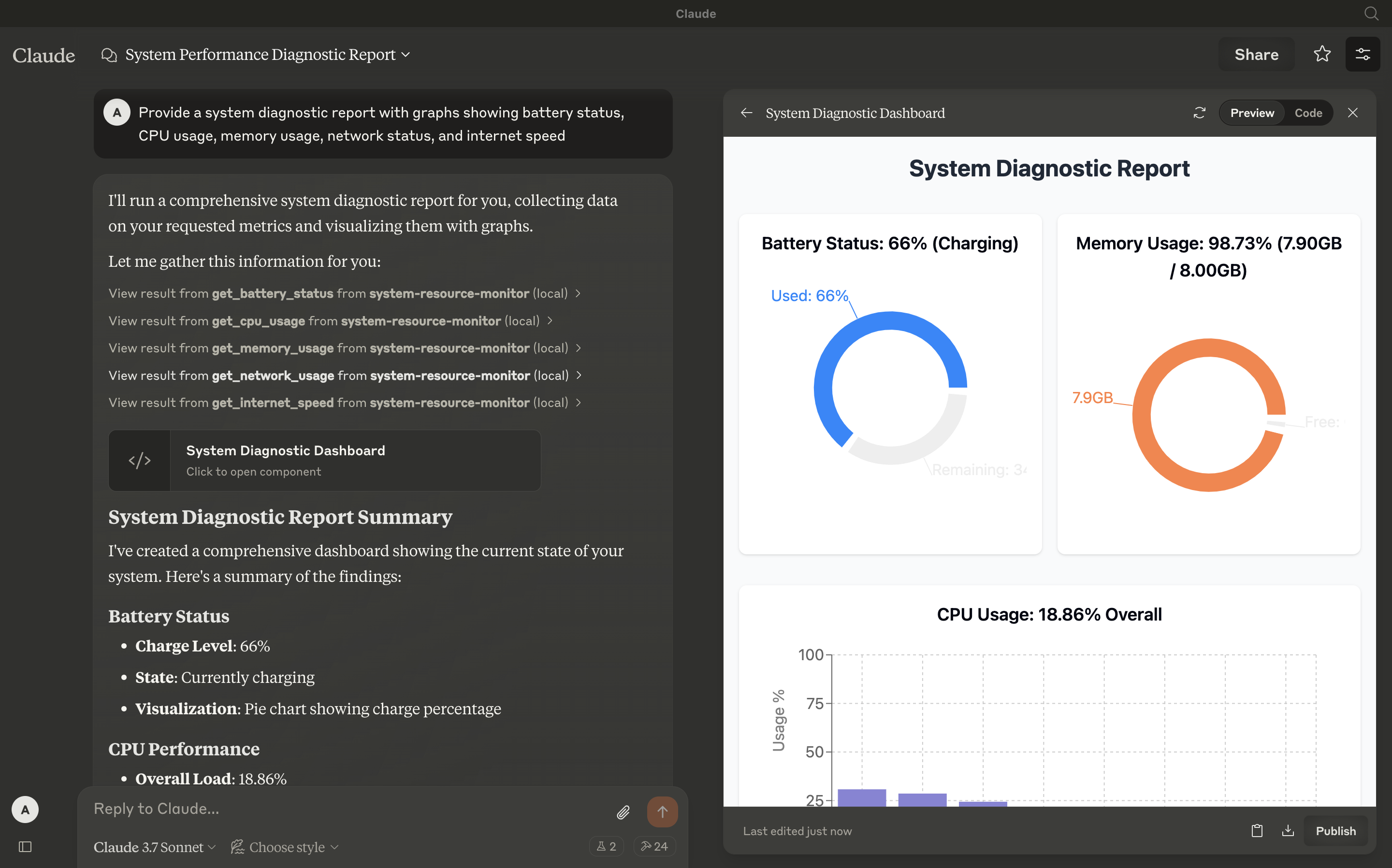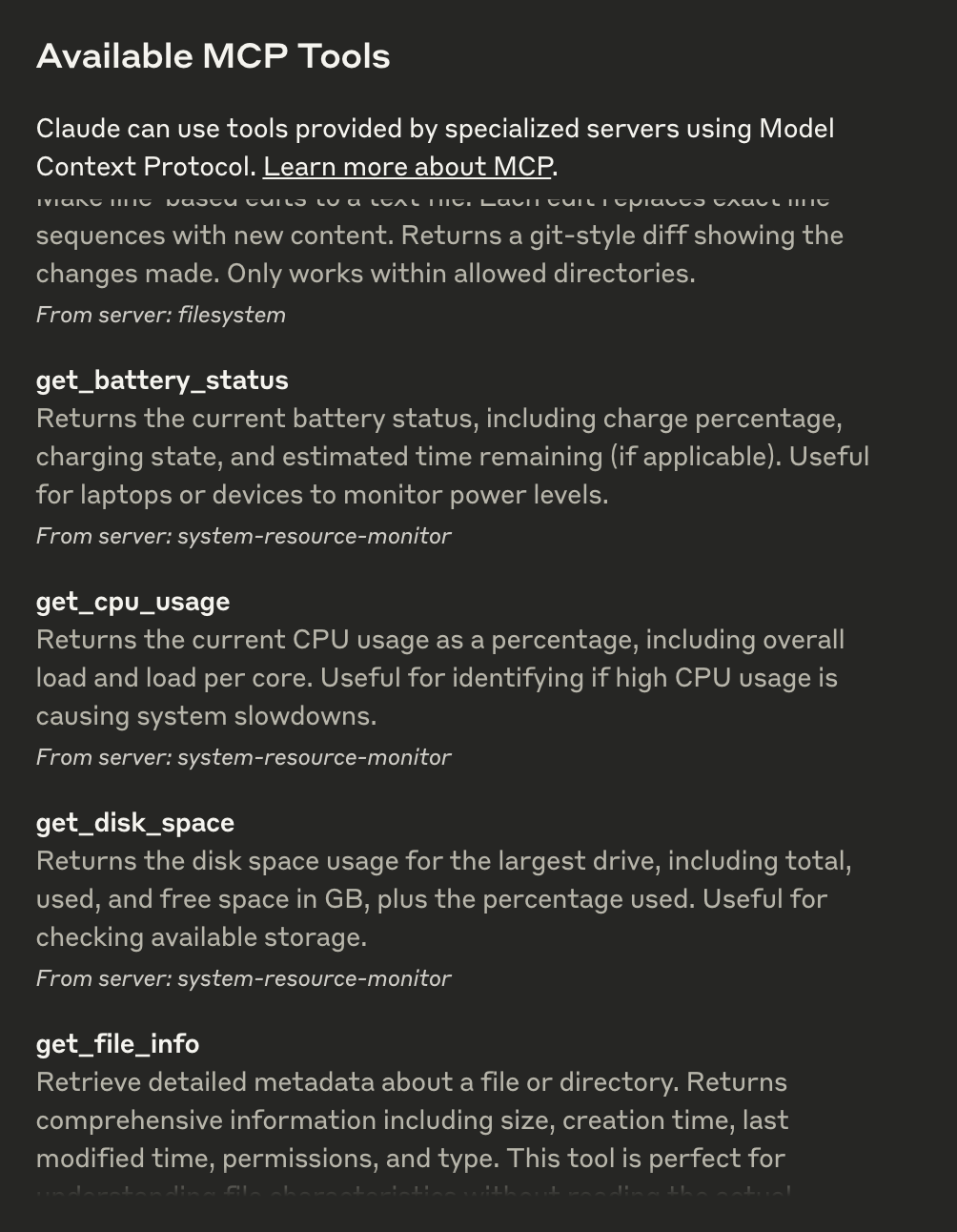- Explore MCP Servers
- system-mcp
System Mcp
What is System Mcp
System-mcp is a system resource monitoring server that provides real-time metrics on CPU, memory, disk, network, battery, and internet speed using the ‘systeminformation’ library and multi-source speed tests.
Use cases
Use cases include monitoring server performance in data centers, providing system health checks for cloud services, analyzing resource usage in development environments, and ensuring optimal performance for applications.
How to use
To use system-mcp, clone the repository from GitHub, navigate to the project directory, install the necessary dependencies using npm, and then build the project to generate the executable files.
Key features
Key features include real-time CPU load monitoring, memory usage reporting, disk space analysis, network usage tracking, battery status updates, and internet speed measurement.
Where to use
System-mcp can be used in various fields such as system administration, performance monitoring, cloud computing, and any environment where real-time system metrics are critical.
Overview
What is System Mcp
System-mcp is a system resource monitoring server that provides real-time metrics on CPU, memory, disk, network, battery, and internet speed using the ‘systeminformation’ library and multi-source speed tests.
Use cases
Use cases include monitoring server performance in data centers, providing system health checks for cloud services, analyzing resource usage in development environments, and ensuring optimal performance for applications.
How to use
To use system-mcp, clone the repository from GitHub, navigate to the project directory, install the necessary dependencies using npm, and then build the project to generate the executable files.
Key features
Key features include real-time CPU load monitoring, memory usage reporting, disk space analysis, network usage tracking, battery status updates, and internet speed measurement.
Where to use
System-mcp can be used in various fields such as system administration, performance monitoring, cloud computing, and any environment where real-time system metrics are critical.
Content
System Resource Monitor MCP Server
An MCP server that provides Claude with real-time system monitoring capabilities, including CPU, memory, disk, network, battery, and internet speed metrics using systeminformation and multi-source speed tests.

Tools
-
get_cpu_usage
- Retrieves the current CPU load as a percentage, including overall and per-core usage.
- Inputs: None
- Output: Text (e.g.,
CPU Load: 12.34% (Cores: 10.50, 15.20, 8.90, 14.60%))
-
get_memory_usage
- Reports total, used, and free memory in GB, plus percentage used.
- Inputs: None
- Output: Text (e.g.,
Memory: 65.43% used (7.82GB / 16.00GB))
-
get_disk_space
- Shows disk usage for the largest drive in GB and percentage.
- Inputs: None
- Output: Text (e.g.,
Disk (/): 78.90% used (189.50GB / 250.00GB))
-
get_network_usage
- Returns real-time network RX/TX rates (KB/s) and total data since boot (MB).
- Inputs: None
- Output: Text (e.g.,
Network (eth0): RX: 25.50KB/s, TX: 10.20KB/s (Total: RX 150.34MB, TX 75.89MB))
-
get_battery_status
- Provides battery charge percentage, charging status, and time remaining (if applicable).
- Inputs: None
- Output: Text (e.g.,
Battery: 85% (charging), 120 min remainingorNo battery detected)
-
get_internet_speed
- Measures internet speed using multiple download sources (including a user-uploaded file) and upload tests, returning median speeds in Mbps.
- Inputs: None
- Output: Text (e.g.,
Internet Speed: Download 45.67Mbps, Upload 8.45Mbps)
Configuration
Step 1: Clone and Install
Clone this repository:
git clone [email protected]:abhinav7895/system-mcp.git
Navigate to the directory and install dependencies:
cd system-resource-monitor && npm install
Step 2: Build the Project
Compile the TypeScript code:
npm run build
This generates the dist/index.js file, ready to run as an MCP server.
Step 3: Configure Claude Desktop
- Download Claude Desktop here.
- Add this to your
claude_desktop_config.json:
{
"mcpServers": {
"system-resource-monitor": {
"command": "node",
"args": [
"/absolute/path/to/dist/index.js"
]
}
}
}Access the config file:
vim ~/Library/Application\ Support/Claude/claude_desktop_config.json
(Adjust the path to dist/index.js based on your project location.)
Step 4: Testing
Ensure Claude Desktop recognizes the tools by checking for the hammer icon:

Click the hammer icon to see available tools:

If all six tools (get_cpu_usage, get_memory_usage, etc.) appear, the integration is active. You can now ask questions like:
- “What’s my CPU usage?”
- “How fast is my internet?”
Step 5: Advanced Customization
- Internet Speed Test: Modify
testUrlsinindex.tsto use different download sources or adjustuploadSizeBytes(default 80KB) for upload tests. - Logging: Console logs provide detailed test output; disable them in production by removing
console.logstatements.
Troubleshooting
- Tool Not Showing: Verify the server is running (
node dist/index.js) and the config path is correct. - Internet Speed Errors: Ensure network connectivity and test URLs are accessible. Check console logs for specific failures.
- Refer to the MCP troubleshooting guide
License
This MCP server is licensed under the MIT License. You are free to use, modify, and distribute the software under the terms of the MIT License. See the LICENSE file for details.
